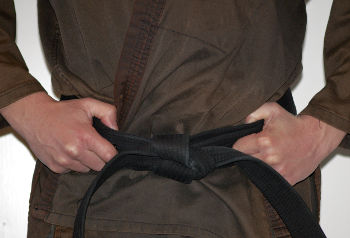Less is more; slower is faster; simpler is better: we've all heard that before. But like so many pleasently-sounding pseudophilosophical phrases waiting to become the title of a self-help book for a stressful job, there's more to it than meets the eye.
One day a martial artist with a black belt in karate showed up at our dojo to train with us. We practice full contact in our dojo, and it took a little while for me to convince him that he should really hit me with full speed and full force. Karate black-belt practitioners can hit both very fast and very hard, and our guest was no exception. I'm sure I may not even have lived to regret it if he had managed to hit me, but I moved out of the way to avoid getting hit. He on the other hand was astonished by my speed: considering the speed of his blow, how could I move out of harm's way that fast? He tried again, hitting faster and harder than ever, and again found me standing behind him outside of his reach.

The answer was simple, of course: I didn't move fast at all. He was somewhat skeptical about that, so I told him to repeat the exercise while watching my feet. True enough, high speed wasn't required: he was striking from a distance of about three feet, and I had to move only a few inches before we'd meet half-way, him in front of me, giving the impression that I had moved behind him. In addition, I didn't move only while he moved. The very second I sensed his preparing the strike, I began to shift my weight, invisible to him. In his blind angle, I could prepare a step forward while he was gathering strength for the strike. When he eventually hit, I had already had plenty of time to start several different moves at the same time. Each move was almost nonchalantly slow, but their combined movement yielded a very fast escape from his punch.
If I had attempted to move away with a single, fast movement, I probably wouldn't have had the time. And even if I were fast, a skilled martial artist will recognize a sudden jerk and compensate; this particular black-belt karate expert would probably have changed his direction without even noticing it and I'd have woken up on the emergency ward with a broken jaw. In his fast attack, my slow movements tricked his brain into thinking I wasn't moving at all, however.
This example illustrates how small, slow movements in practice become fast and comparatively large movements. Less (movement) really becomes more, and slower really becomes faster (than him).
But the Devil lurks in the details. The movements may be small, but there are many of them, and coordinating them all for a proper angle at the right time is no smaller amount of work than a single, powerful move. There is no less than more, only different moves and distributed timing. "Less" must flow, and "slow" must be fluent, or the result will be less and slow, too. It can take years of practice to learn how to do more by doing less and to move fast by moving slowly. (As it turns out, "less" and "slow" take a smaller toll on the body, making them vital for an old martial artist whose body has become fragile. But that is another story.)
 And so "less" is no less.
And so "less" is no less.
If one interprets "less is more" as sanctioned laziness, one will only accomplish less. That is, if a person believes he is an artist because he draws child-like sketches when in fact that is all he can draw, then he's doing little, not less. An artist that grew up in my childhood village spent years as an apprentice of Emil Nolde and another several decades copying Nolde's style until he finally found his own style and gained recognition shortly before the end of his career. It took him a lifetime; don't expect to become a famous artist for doing any less than Ernst Tranekjær, Nolde's apprentice. The Japanese term "shuhari" communicates this tedious training. That's why people spend years at universities and even then may never reach the last of the shuhari stages of learning.
You won't get thanked if you solve a task by doing only simple work, by doing less than requested, or by doing it slowly, expecting that this will create a perfect result. It takes great skill to make that simple which is complicated and to solve an extensive task by doing only the least required.


Your skill in making the complicated, simple is incredible.